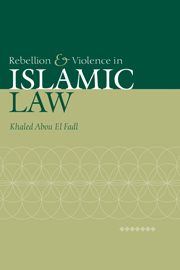Book contents
- Frontmatter
- Contents
- Preface and acknowledgments
- Introduction
- 1 Modern scholarship and reorienting the approach to rebellion
- 2 The doctrinal foundations of the laws of rebellion
- 3 The historical context and the creative response
- 4 The rise of the juristic discourse on rebellion: fragmentation
- 5 The spread of the Islamic law of rebellion from the fourth/tenth to the fifth/eleventh centuries
- 6 Rebellion, insurgency, and brigandage: the developed positions and the emergence of trends
- 7 The developed non-Sunnī positions
- 8 Negotiating rebellion in Islamic law
- Works cited
- Index of names
- Index of subjects
1 - Modern scholarship and reorienting the approach to rebellion
Published online by Cambridge University Press: 15 December 2009
- Frontmatter
- Contents
- Preface and acknowledgments
- Introduction
- 1 Modern scholarship and reorienting the approach to rebellion
- 2 The doctrinal foundations of the laws of rebellion
- 3 The historical context and the creative response
- 4 The rise of the juristic discourse on rebellion: fragmentation
- 5 The spread of the Islamic law of rebellion from the fourth/tenth to the fifth/eleventh centuries
- 6 Rebellion, insurgency, and brigandage: the developed positions and the emergence of trends
- 7 The developed non-Sunnī positions
- 8 Negotiating rebellion in Islamic law
- Works cited
- Index of names
- Index of subjects
Summary
ISLAMIC REBELLION IN MODERN SCHOLARSHIP
Aḥkām al-bughāh, or the juristic discourses on rebellion, have received very little attention in both non-Muslim and Muslim modern scholarship. Nevertheless, there has been no shortage of statements about the absence of a right to rebellion in Islamic legal discourses. Most commentators have tended to focus on the history of Islamic discourses on the caliphate, and then deduced from this history the Islamic position on rebellion. Very little attention has been given to the specific juristic tradition from which aḥkām al-bughāh arose, or to the specific legal paradigm upon which Muslim jurists relied. Contemporary commentators have tended to treat Muslim juridical pronouncements on the duty of obedience to those in power as if they are a genre of political thought or theory. The legal culture that provided these jurists with the terms of their discourse, and that imposed modes of thought and expression, has been largely ignored.
In its most basic formulation, the accepted thesis is that Muslim jurists moved from the absolute realm of political idealism to an absolute realm of political realism. Muslim jurists insisted on strict qualifications for the position of caliph, and insisted that the caliphate only be assumed through a proper caqd (contract) and bayca (pledge of allegiance). The caliph had to be pious and just, and had to enforce the Sharīca. Importantly, only a single, just imām may represent the khilāfa and the umma.
- Type
- Chapter
- Information
- Rebellion and Violence in Islamic Law , pp. 8 - 31Publisher: Cambridge University PressPrint publication year: 2001

